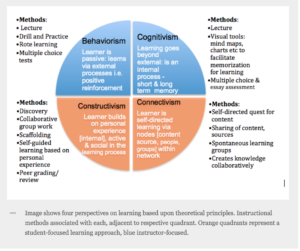Upon consideration of this past week’s readings and class discussions, my teaching philosophy and classroom practices are underpinned by a combination of constructivist and connectivist theories of learning. These frameworks emphasize the active role of learners in constructing knowledge, the importance of social interactions, and the recognition of the dynamic nature of information in the digital age.
I can admit, for the 13 years I spent as a high school social studies teacher, I did not often consider my own epistemological and philosophical beliefs in great detail. I do remember, several times, evaluating and evolving my own pedagogy, but not to the point where I was examining how my students knew what they knew, and the ways in which I attempted to teach them to do so. So, now that I have moved into the administrative role, I will try to use the knowledge I have gained to support instructional practice for my colleagues, and build capacity on how to best serve the needs of all students.
This article from BC Campus provided several noteworthy examples of how philosophies can be interpreted and applied in education. Looking back, I would suggest that constructivism has been a fundamental aspect of my teaching philosophy. This theory suggests that learners actively build their own knowledge through interactions with experiences and reflection. In my classroom, this translates to creating an environment that fosters inquiry, problem-solving, and collaboration. As the social sciences have changed significantly over the past decade, it has been important to give students opportunities to approach events and issues with an open mind and with the tools to create their own understanding and bias.

Connectivism, with its focus on networks and connections, has also significantly influenced my teaching career. In today’s digital era, where information is abundant and easily accessible, helping students navigate the internet and find relevant and quality information is paramount. I spent much of my class periods (Grade 12s more than 9s) incorporating collaborative projects, discussions, and the use of online resources to facilitate a networked learning environment. Knowing that students will find whatever information they are looking for, it is always important to help them navigate the process of finding and assessing information that they find.

Earlier in my career, I might have leaned more towards a traditional, instructor-centered approach. I remember times, especially during busy times of the school year, I would get stuck in the quicksand of “throwing on a movie” (What a social studies teacher!). Did students love it? Probably some… What and how did students learn from it? I’m not sure I could tell you. There were times, however, that I was able to create assignments and activities that incorporated audio and visual technology to build on constructivist and connectivist approaches. Pre-video discussions, extended research activities, examining bias are just a few examples of how I found success in using audio and video to support student learning.
The integration of educational technology has become essential not only for delivering content efficiently but also for fostering digitally literate students. Using connectivist and constructivist approaches will continue to help students develop their tech skills, which will continue to be more and more valuable as we continue through this digital age.
I agree with your point saying how important it is to help guide students through the abundance of information they can access online! It seems like the importance lies more in being able to analyze what they are reading and weeding through it.
Hi Michael,
Yes, I certainly agree with you when you start to unpack some of these deeper concepts you often feel they have been neglected, or absent in your teaching. And I sometimes think that maybe it’s just more we think about them explicitly with a deeper understanding of them, compared to an implicit thought that governed the way that you orchestrated your classroom. Connecting these terms to pedagogy and students certainly opens your eyes to a new way of seeing education.
I also really like connectivity theory as it deeply reflects my values and philosophies of connections and people’s hearts that seem to bring movement to learning when a solid relationship has been formed.
Thanks for sharing, Michael!
What would be your go-to movie to play in the classroom on a rainy day when you felt under the weather?.. because I’m sure that would only be the time it would come on.
I enjoyed reading your post.
I also did not take in my own epistemological beliefs and consider which approach I was using either, until after our class discussion.
I agree that using connectivism and constructivist approaches will help students develop their tech skills now and in the future!